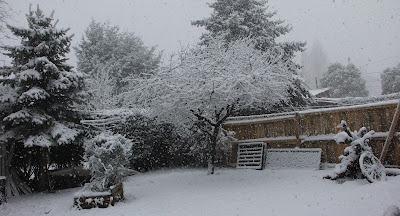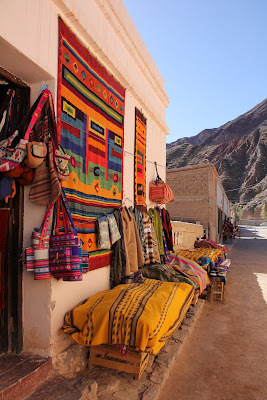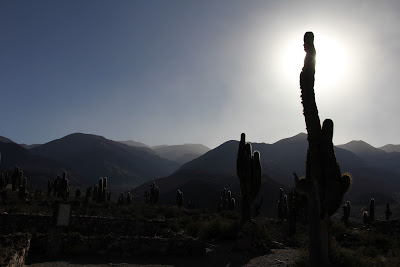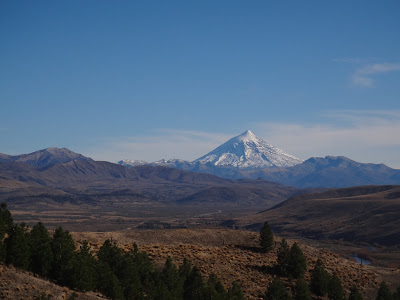My sincerest
apologies for the lengthy absence. The trip to the north-west was quite a long
one. I then found myself stuck in Rosario with a bit of a stomach bug, without
a computer or internet. How I survived is beyond me. Sick stomach side, the
trip was incredible - another one of those life-changing, unforgettable ones
where you see amazing things in the company of amazing people. I'm extracting
the order of events from my camera which is still set to Australian time so the
division of days is a little harder to decipher. Just keep in mind that this
all happened over a course of about 11 days.
As per usual, the
best place to begin would probably be the start of my trip. Thankfully the
travel to Rosario went a little more according to plan this time, with no
missing of buses, nor any other major mishaps. It also seemed to fly by much
faster as I had a travel buddy - a Dutch girl that had just finished her
exchange in San Martin de los Andes and would be heading home after the trip.
We got along well and talked a lot (but thankfully not so much that I would
lose my voice again). When we got to Rosario we had several hours to fill in so
we met up with some other exchange students that would be travelling to the
north with us. This was when I first met the two infamous Scandinavian exchange
students whom I had heard so much about. I would end up spending most of the
trip in the company of the pair - a short, solid Norwegian and a tall blonde
Swede. To my delight they spoke English all-but perfectly - as if it were their
first language. One had with him a football (soccerball) that would make an
appearance at every possible opportunity throughout the week.
Later we all headed to the bus where I caught up with the small group from
orientation week that had decided to take part in this trip as well as a bunch
of new faces. I also had the pleasure of meeting a South African that was
seeing off one of my German friends. I always forget just how much of an
international experience I am having! So far I've met people from no less than
12 different countries. The South African is in Argentina with his parents on
missionary work. He was bursting with energy and a pleasure to be around,
marvelling at my Australian accent as he had never met an Australian
before.
From there, the real trip began. Our first stop was the bus terminal in
Tucuman, about 11 hours drive from Rosario. There we picked up a couple more
exchange students who had travelled directly to Tucuman from Mendoza. We also
had a chance encounter with two Australian exchange student, one of whom I had
travelled to Argentina with! The other was doing Australia proud, on crutches,
nursing a hangover and speaking some of the worst Spanish I have ever heard
(including my own).
Along the way to our accommodation we stopped at a beautiful lake to have lunch. Unfortunately its name and location escapes me, however I did manage to capture a bunch of nice photos.
I fell in love with San Miguel de Tucuman instantly. The architecture was
spectacular and everything had a very welcoming feel. We also noted quite a
difference in the people - darker skinned and seemingly with a strong
indigenous influence. This difference was to become more pronounced the further
north we travelled. We had a guided tour of the city, visiting a little museum
as well as a couple of churches. The beautifully constructed and historically
significant churches are a famous highlight of the north-western provinces.
After this we headed skyward to get a wonderful view of the city at night. We
got back to the hotel in time to see the majority of a football game on telly
between Argentina and Bolivia.
From there, we made our way to Tilcara, Jujuy, our base camp for the next
couple of days. On the way we bore witness to some truly spectacular scenery -
the kind of stuff that I had previously held as a stereotypical view of South
America. In fact, almost every location that we visited conformed to that
stereotype - placid natives, jagged mountains, simple constructions and an
abundance of cactuses and llamas.

While in Tilcara we also travelled to many of the surrounding tourist towns, including Purmamarca and Humahuaca. These towns were brimming with little stores to purchase souvenirs and the like. They were always exploding with colour, as bright coloured fabrics are another famous trait of the region. It took all my strength to not purchase something in every store that I entered, although I did somehow end up with several beanies, jumpers and other assorted bits and pieces. I was not the only one however, my Scandinavian amigos went as far as purchasing a poncho each. We were quite an amusing sight for many of the locals as we ran around playing football in the plaza in Tilcara.
Near the town of Tilcara is the remnants of a native village providing some beautiful scenes - stone buildings nestled in the hills amongst the cactuses. We had a guide show us around before roaming the ruins to get some photos.
From Tilcara we headed for the city Salta, stopping along the way at Las Salinas Grandes - giant salt plains. It was very impressive - a flat sea of white stretching out as far as the eye could see. We also found it to be a perfect spot for a bit of football.


The city of Salta was also very much to my liking as far as cities go. It was
quite clean and open and I really enjoyed the architecture. The famous catholic
church near the centre of the city was stunning. We spent two nights in Salta, on
the second visiting the boliche/restaurant/bar, Balderrama de Salta - a
definite highlight of the trip and a must see if you are ever in the area. As
we ate some of the local cuisine - Saltinean empanadas and locro - we were
treated to a display of singing and dancing in various traditional styles of
the region. The dancing was something to behold. The men in particular were very impressive to
watch, one of the styles involving a great deal of jumping and boot-stomping. I
also thoroughly enjoyed the musical entertainment, including three different
bands playing various forms of regional folklore - from the traditional to a
more modern style. Members of our group were also invited to try out a bit of
the dancing with the professionals and by the final band we were all on the
dance-floor having a great time.
During our stay at Salta we also took cable-cars up one of the nearby mountains
to gain a stunning view of the city followed by an asado lunch - delicious as
always! Unfortunately, at some point that morning we managed to misplace our
football. The realisation of its absence was a very sad moment for all of the
male group members.
Another very famous attraction of the north-western provinces is the 'Tren de
las Nubles', a heritage railway that travels to an altitude of over 4000m - the
third highest in the world. For some reason unbeknown to me (some time problem
I think (my Spanish failed me at this point)) we elected to take the accompanying
car route, rather than travelling in the train itself. The trip was still very
cool - we got to travel through a couple of tiny little villages on the way, as
well as seeing some really cool scenery, complete with llamas. We also went to
one of the massive bridges running across a valley - the type of thing you see
in typical photograph of the train. Whilst taking in the view from a distance,
a couple of the males decided to head down the hill to empty their bladders.
Lacking a football to occupy ourselves,
my Swedish mate and I decided to start hurling rocks in the general
direction of our urinating companions (as boys do). Unfortunately, I was the
one with the most accurate throw and found myself being run down by an angry
Norwegian at an altitude of 4000m - a very different kind of breathtaking
experience. (I have a bunch of photos of this trip as well as the night at
Balderrama, however I haven't got to converting them to a format I can upload.
Keep on the lookout though, I'll do my best to post them at some
point.)
On a separate trip to some little villages in the mountains, the altitude
rendered me a little worse for wear. Some of us that were really starting to
feel the effects of altitude sickness decided to try out a local remedy - the
chewing of coca leaves - the plant from which cocaine is extracted. Don't
worry, the amount in the leaves is minute and at lower altitudes we found that
they merely induced hyperactivity and a slight numbing of the body. They were
very effective in curing the altitude sickness however.
From here, we began our return to Rosario, staying one night in Cafayate. We
stopped at various attractions on the way home. Firstly, La Gargantua del
Diablo, a very impressive rock structure formed by wind and water over the
ages. For me, the surrounding landscape was reminiscent of typical Australian
outback scenery (though perhaps the mountains were a little out of place).
We
also stopped at the ruins of a village belonging to the ancient Quilmes people.
It was constructed on the side of a hill and surrounded by massive, flat,
cactus covered plains. Later that day, our Mendoza contingent was dumped at the
Tucuman terminal and from there, it was straight back to Rosario, arriving
early the following morning.
Seven of us stuck around in the main area of Rosario for one final catch up.
This included a nice lunch and a guided tour of the city's art museum by the
Scandinavians (who are probably sick of me grouping them together in this
fashion, but it's far easier this way). They had volunteered at the museum, so
they knew a bit about the art, and as the galleries were currently being
changed, we got in for free and had the place completely to ourselves. On the
ground floor there was a grand piano, and with permission from the museum
staff, our big German companion gave us a private performance. It was
exquisite! To see a massive German guy, with his interesting and very amusing
use of the English language, caught in the improvised flow of his own jazz compositions,
was something that I will always remember.
From there we returned to the Wep House, struggling to find the words to
describe the beauty we had just witnessed and recounting a few of the more
amusing moments from the trip, most of which revolved around the big German.
Everybody collected their things and gradually we parted ways, promising to
make every effort to see each other and visit respective home countries over
the coming years.
Eventually I made
the all too familiar, day-long trip back to Junin. It was mostly uneventful,
other than some amusing conversations with a couple of fascinated primary
school aged siblings that were seated either side of me, the younger of whom
never seemed to accept that Australia is not a part of Italy and insisted on
quizzing me on my Spanish vocabulary. It made a fitting, light-hearted end to
an awesome trip and reminded me just what this adventure is all about - the discovery
of another people, country and culture.

















































